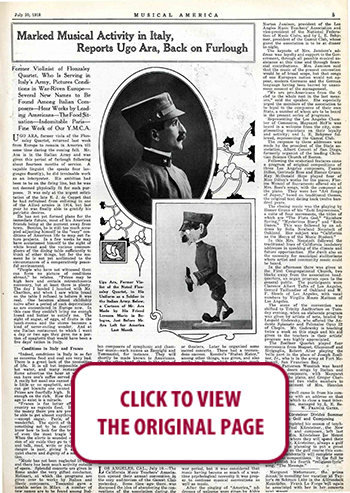 100 YEARS AGO IN MUSICAL AMERICA (248)
100 YEARS AGO IN MUSICAL AMERICA (248)
July 20, 1918
Page 5
Marked Musical Activity in Italy, Reports Ugo Ara, Back on Furlough
Former Violinist of Flonzaley Quartet, Who Is serving in Italy’s Army, Pictures Conditions in War-Riven Europe—Several New Names to Be Found Among Italian Composers—Hear Works by Leading Americans—the Food Situation—Indomitable Paris—Fine Work of Our Y.M.C.A.
UGO ARA, former viola of the Flonzaley Quartet, returned last week from Europe to remain in America till some time during the coming fall. Mr. Ara is in the Italian Army and was given this period of furlough following about fourteen months of service. A capable linguist (he speaks four languages fluently), he did invaluable work as an interpreter. His ambition had been to be on the firing line, but he was not deemed physically fit for such purposes. It was only at the urgent solicitation of the late E. J. de Coppet that he had refrained from enlisting in one of the Allied armies in 1914, but last year he was finally able to gratify his patriotic desires.
He has not yet formed plans for the immediate future, most of his American friends being at the moment away from town. Besides, he is still too much occupied adjusting himself to the “easy” conditions of American life to map out future projects. In a few weeks he may have accustomed himself to the sight of white bread and the various commonplaces of the dining table sufficiently to think of other things, but for the moment he is not yet acclimated to the circumstances of a comparatively peaceful environment.
“People who have not witnessed them can form no picture of conditions abroad,” he relates. “Prices may be high here and certain retrenchments necessary, but at least there is plenty. The day I landed I lunched with Mr. Charlton, and when I saw white bread on the table I refused to believe it was real. One becomes almost childishly naive after a period of such deprivations as are encountered in Europe now. In this case they couldn’t bring me enough bread and butter to satisfy me. The sight of sugar, of eggs, of fruits in the lunch-rooms and the stores becomes a kind of never-ending wonder. And at one Italian restaurant to which I went a day or two ago they gave me a portion of spaghetti that would have been a five days’ ration in Italy.
Conditions in Italy and France
“Indeed, conditions in Italy in so far as concerns food and coal are very bad. There is a great lack of the necessities of life. It is all but impossible to get hot water, and many restaurants in Rome advertise the hour at which one can have one’s coffee served fairly hot. A really hot meal one cannot get. There is little or no spaghetti, and while one can get biscuits one cannot get bread. Prices are fearfully high. It is all hard enough on the rich. How the poor manage to exist is a miracle.
“France is far better off than my country as regards food. If you have the money there you are pretty sure to be able to get almost anything you want—except sugar. Paris, of course, is wonderful. The spirit of the people is something not to be described. They know how to look for the brighter side of even the most tragic happenings. When the alerte is sounded on the occasion of air raids they go to their cellars and talk, read, write or play until the danger is past, giving it almost the quiet charm and dignity of a social function.
“Music has not been neglected in Italy and there has been much activity outside of opera. Splendid concerts are given in Rome under the very gifted conductor, Molinari, at which the programs are given over to works by Italian and Slavic composers. Toscanini gave a notable series in Milan. A number of new names are to be found among Italian composers of symphonic and chamber music—such names as Respighi and Tommasini, for instance. They will shortly be made known to Americans. On the other hand, there is the plan of familiarizing Italians with American music. That has resulted in bringing them compositions by such men as Loeffler, Carpenter, Chadwick. There is going to be much more interchange of this kind.
“The disaster of Caporetto last fall had an unhappy effect on many musical schemes, among them one by Bonci in Bologna. The tenor has refused all offers to leave the country while his son is fighting. He had planned an operatic season, but this had to be canceled as nobody could think of going to operas or theaters. Later he organized some sacred concerts. These had a tremendous success. Rossini’s “Stabat Mater,” among other things, was given, and also works by Perosi, which are very much in favor now, especially in Rome.
America: the Allies’ Hope
At present the hope of all the Allied countries lies in America, the thought of whose freshness and power gives strength to all. But it is not only the fighting power of America that has meant so much. The work of the Y. M. C. A. in providing for the entertainment and welfare of troops, who would otherwise become demoralized through the monotony of their existence, is something that can never sufficiently be praised.”




 RENT A PHOTO
RENT A PHOTO





